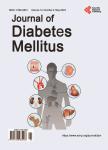The effect of weight loss on fasting blood sugars and hemoglobin A1c in overweight and obese diabetics and non-diabetics
The effect of weight loss on fasting blood sugars and hemoglobin A1c in overweight and obese diabetics and non-diabetics作者机构:Department of Preventive Medicine and Public Health School of Medicine-Wichita University of Kansas Kansas USA
出 版 物:《Journal of Diabetes Mellitus》 (糖尿病(英文))
年 卷 期:2012年第2卷第1期
页 面:126-130页
学科分类:1002[医学-临床医学] 100201[医学-内科学(含:心血管病、血液病、呼吸系病、消化系病、内分泌与代谢病、肾病、风湿病、传染病)] 10[医学]
主 题:Long-Term Weight Maintenance Hypertension Diabetes Hemoglobin A1C Low-Energy Diets
摘 要:BACKGROUND: Diet and exercise are recommended first line treatment for overweight, obese, and diabetic patients with the goal of decreasing weight and improving glycemic control. The goal of this study was to determine the effect that a low calorie diet and behavioral modification program, as implemented by a medically supervised weight loss program, would have on the fasting blood sugar and hemoglobin A1c in overweight or obese diabetic and over-weight or obese non-diabetic participants. METHODS: Charts from 2009 to 2010 were reviewed for 310 diabetic and non-diabetic patients enrolled in the Via Christi Weight Management (VCWM) program in Wichita, Kansas. Data were collected before and after patients underwent a program of meal replacements and weekly physical activity lasting 12 weeks. Variables included pre and post treatment fasting blood sugars, hemoglobin A1c, body mass index, percent body weight lost, and diabetes status. RESULTS: Diabetic participants lost an average of 11.7% of their initial body weight (IBW), and non-diabetic patients lost 12.5% of their IBW over the treatment course. Post-treatment average fasting blood glucose (FBG) decreased in both diabetics and non-diabetics by 15.53 mg/dL and 8.46 mg/dL, respectively (p = 0.08). Diabetic patients experienced a significant decrease of 0.83% from pre to post-treatment in hemoglobin A1c. For diabetic and non-diabetic groups, the changes in FBG were correlated with the change in weight. CONCLUSIONS: Diet and exercise, as prescribed by the VCWM program, is effective in reducing hemoglobin A1c in diabetics and reducing fasting blood sugars in both diabetic and non-diabetic patients.



